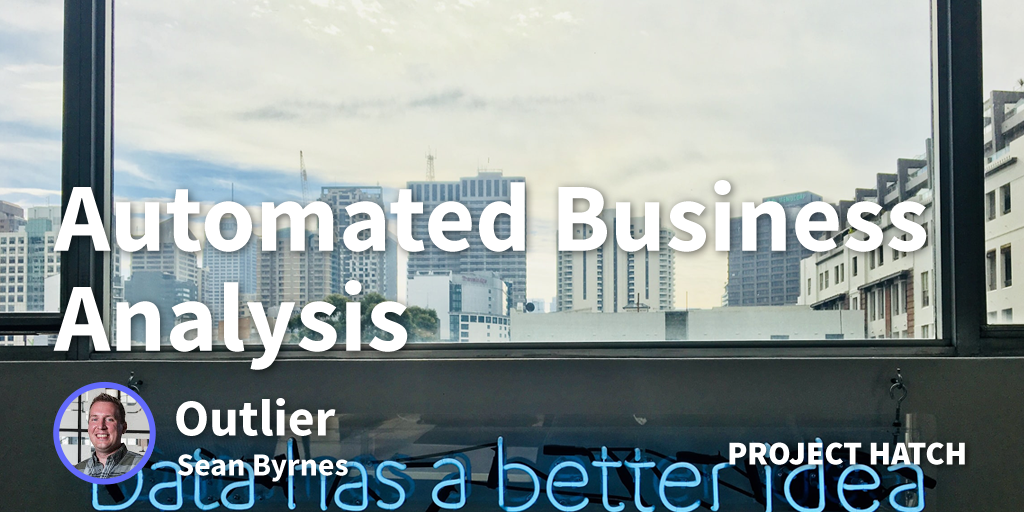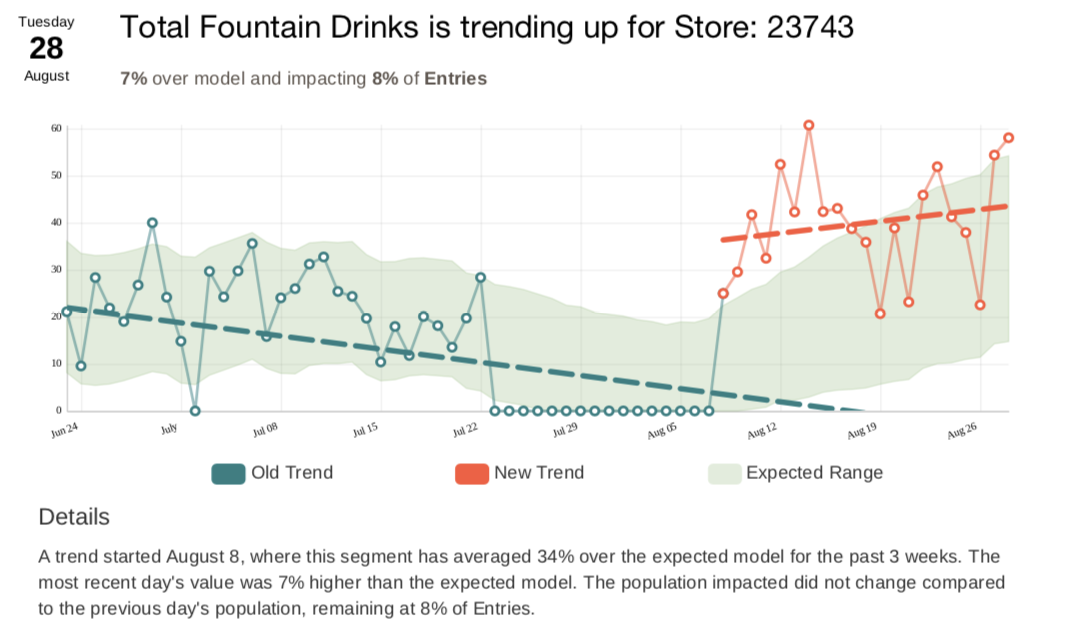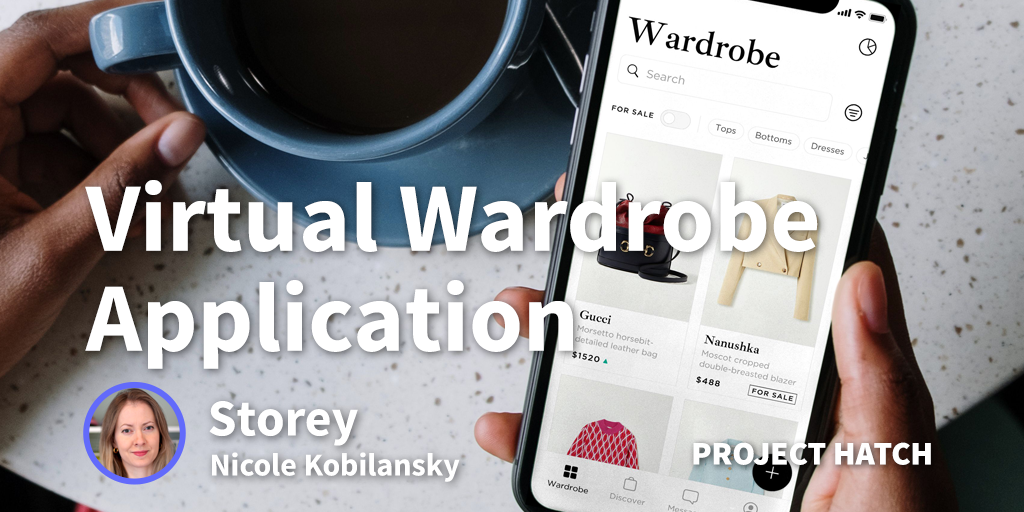Every company in every location and every vertical was struggling with finding value in their data. Everywhere I went, every company would ask me the same thing: “Sean, I love this data that you’re giving me. But what am I supposed to look for in all this data?”

When I started thinking about how to answer their questions, I realized that we had reached a new era of business intelligence.
What prompted you to start your AI company Outlier?
Companies have so much data - and it’s getting to be a bigger issue every day - that all the tools we have such as spreadsheets and dashboards are breaking down under the burden. People don’t know what to look for in the data, and as a result the data becomes a burden instead of an asset.
Outlier arose from my belief that business intelligence needs to change, we need a new approach for the next decade. Instead of tools that answer questions we know to ask, we need tools that ask better questions for us. That vision became automated business analysis: the ability for software to uncover emerging problems and opportunities automatically, using AI.
How did you validate your idea?
When my co-founder and I first started Outlier, all we had was a problem we wanted to solve. Could software analyse data, automatically, and find important questions hiding in it? We didn’t know if it was possible, but before we started building, we needed to make sure there was value in solving the problem.
So, for the first six months of Outlier we offered ourselves as free consultants to a wide range of companies. They would give us access to their data and we, as humans, would look through for unexpected and unknown patterns. In doing so we wanted to find out what kind of value was hiding in these unknowns? Were there common applications of unknowns that would be a foundation for a product? In those six months we were blown away by the response.

In just 2 or three days of exploring data for these companies we were finding things that literally changed the course of their business. There was so much hiding below the surface of their data that they had no way of finding. If we could have that much impact, a product that could do the same job at a massive scale had unlimited potential.
From there, we realized there was value, but we still didn’t know what the product might look like, so we started building prototypes. The first few were really bad, but the fifth attempt was pretty good and is the great, great, great ancestor of the product we offer today. However, had we not started by “being” the product ourselves, I doubt we would have found the right solution in the end.
What kind of companies are a good fit for Outlier?
Outlier works really well for customer insights and marketing teams because it can tell you when customer behavior changes so you can quickly adjust your marketing focus. But it works equally well for supply chain professionals because unexpected changes in the sales and supply chain can lead to massive lost opportunity. Our customers span many different industries ranging from retail to travel to financial services. While these might sound like vastly different businesses, these companies all work with millions, or hundreds of millions, of consumers and have a premium on reacting to changes quickly. Outlier becomes the competitive advantage they need to spot changes in consumer behavior early, so they can move before the competition.
Where did you meet your cofounder/founding team?
My cofounder Mike Kim (our CTO) and I have been friends for a long time, but had never found the right time to work together.

Mike is one of the most brilliant data scientists and engineering leaders in the industry, so he was the first person I spoke to about the idea that became Outlier. We spent a few months working together before deciding to become co-founders.
Any tips for finding first employees?
I have a few rules I live by when it comes to building the best founding team, since there can be a lot of traps you have to avoid. My guidelines include:
- Can you handle the stress effectively? Being friends with someone does not mean you know how they react when things get tough. If you previously worked together in a highly stressful environment, you know how they handle pressure and you have probably settled at least a few disputes successfully. If you haven’t been in a stressful position, you need to find a way to do so in order to set expectations effectively. For Mike and me, we worked on some side projects under tight deadlines and found a great collaboration framework that we still rely on today.
- Do you have the same runway? If you have enough savings to last two years (which I recommend) and your cofounder has only six months, then your company only has a six-month runway. That is rarely enough time to prove and test your idea, so you’ll end up making decisions you might not otherwise make. Make sure you each have equal footing and understand the end goal and timeline for success.
- Do you have complementary skills? Too many companies are started by people with the same skills. This seems like a good idea when there’s code to be written and two coders are faster than one. However, once the code is written, who will do the marketing, sales, fundraising, customer support, etc.? Bringing on a co-founder with complementary skills gives you a better chance of success by diversifying your strengths from the outset. My expertise was in product design and customer development, which was perfectly complemented by Mike’s expertise in data science and engineering.
The problem we wanted to solve with Outlier resonated so strongly that we were able to quickly assemble a great team of experts, all of whom had struggled with exactly the same problem themselves. If you look at the early team at Outlier, it was more experienced than most early teams and that is due to the strength of our vision and how much excitement everyone had around solving the problem of data overload.
Did you run any companies prior?
In 2014, I sold my analytics company Flurry to Yahoo after a nine year journey. When it was acquired, we had about 500,000 analytics customers around the world and I had been travelling and meeting with as many of them as I could.
What is a funny start-up story from when you were getting started?
When I started Outlier I wanted to own a domain first, so I wouldn’t waste time later trying to find an identity for the company. At the time, the .ai domain had recently become available and that seemed like a great fit for what I was thinking. But this was the early days for that domain and there was only one registrar on the internet that would sell .ai domains. So I went online to buy outlier.ai and I pressed the purchase button on this sketchy website and I was like, “That was a mistake. I shouldn’t have done that.”
Four days later, my domain is still not live, I’m like, “Yep, my identity was stolen. It’s definitely a scam.” But I reached out and asked them, “Hey, what’s up with the domain?”
And they responded, “The person who runs that domain only works on Sunday afternoons, so you have to wait for Sunday afternoon and he will type your domain into the root server and you’ll be up and running.” And that’s exactly what happened. So, in the end it worked out, but for a few days there I thought I’d just handed over my whole identity.
How have you been getting funding?
One advantage I have as a repeat founder is that it can be easier for me to get a first meeting with investors. But that’s really where it ends. From there on, after that first meeting, I am like everybody else out in the universe and I have to prove to investors that Outlier is the best investment opportunity available to them. Luckily, our vision has been just as compelling to investors as it is to us. We raised a $1.2 million seed round in 2015 led by First Round Capital. That was the first validation we had and since then we’ve successfully raised a series A and B, taking us up to $30M in total funding.
What are some shortcuts you can take as a founder?
Whenever people ask me about the most valuable lessons I’ve learned as an entrepreneur, three things come to mind.
- Focus on the problem you want to solve. Most founders fall in love with a product idea, so they start with a solution. If you start with a problem and leave yourself open to many different solutions you can learn from the market and find the best solution to build your business around. Spending six months exploring and selecting the right problem can save you six years of wasted effort trying to build a business around a flawed idea.
- Admit what you don’t know. Too many founders believe in the myth of the perfect CEO, who has all the right answers at all times. The reality is that the best leaders are constantly learning and that requires humility. Admitting that you don’t know something opens an opportunity to learn, and the more learning you do the more likely you build a business that is based on real fundamentals.
- Productivity is the only resource that matters. Far too many founders confuse motion with progress and are very busy but get nowhere. Understanding how to spend your time and putting thought into what you work on, instead of just working harder, is the difference between finding success and burning out. Many founders brag about how many hours they work, but the reality is that most companies are defined by 3 or 4 decisions that are absolutely critical.
How important is getting an outside perspective?
I think that having the ability to view and evaluate your organization from an outsider’s perspective is an important skill. Being objective (and critical, when needed) illuminates organizational strengths and weaknesses that you may not realize exist when you are part of the internal workings and leadership of a company.
One way to shift your perspective is through a strong Board of Directors. I recommend building one as early as possible, leveraging individuals who bring different experiences and viewpoints to the table. This outside perspective and added pressure to hold your team accountable can open your eyes to strategic opportunities, just as much as it can uncover areas of weakness.
I guarantee that every leader will, at some point, lose their objectivity. It’s difficult not to, when we are so close to the business. When this happens to me, there are a few tactics I use to reset my thinking:
- Reverse pitch.
- Seek out critical feedback.
- Dedicate time to think.
Do you have any favorite business books you recommend to other founders?
I have a number of books I’ve read that have been very valuable. You can find them on my personal blog.
What are the next products you are working on?
At Outlier, we are at the forefront of an entirely new category of software in automated business analysis. That is exciting since there is so much to be done, so much to be invented and so much to be discovered. We roll out new forms of automated analysis every quarter that are all firsts, which is the most rewarding part of being at the bleeding edge of technology. This category will mature over the next decade and I can only imagine what new things we will invent over that time.
Are there any releases you can tell us about?
At this time, I don’t have any new Outlier releases to share. We are constantly updating our product with deeper integrations and customer-requested features. You are welcome to check out our news releases for the latest in our product news.
Where do you see the company in five years and would you sell Outlier?
In five years, I expect that Outlier will still be the leader in automated business analysis, which will prove to be the most important category of enterprise software. ABA will change how businesses operate in a way we haven’t seen since the advent of business analytics. We have a head start today, but I realize that it will take a lot of hard work to stay on top as the industry expands and accelerates. However, I can’t imagine anything more exciting, more fulfilling or more important that we could be doing.
| Company Name: | Outlier |
|---|---|
| Founder: | Sean Byrnes |





